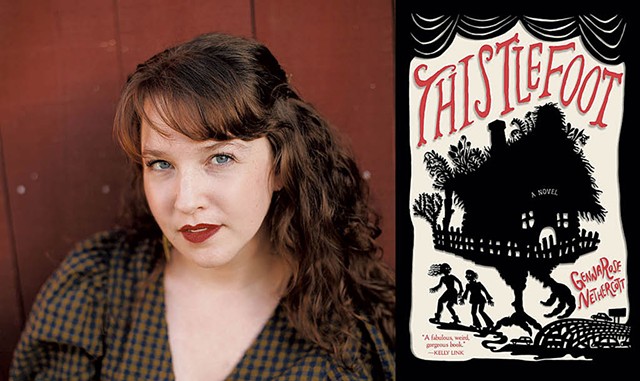click to enlarge 
- Courtesy
- GennaRose Nethercott | Thistlefoot by GennaRose Nethercott, Anchor Books, 448 pages. $28.
In her 2018 book-length poem The Lumberjack's Dove, chosen by Louise Glück for the National Poetry Series, GennaRose Nethercott of Brattleboro offers "three rules of storytelling":
1. Only tell a story if you have to. If you can
survive without telling it, keep mum.
2. A story is a two-way mirror. Don't think
the characters cannot see you. It's safest to
assume they can always see you, & they
know exactly where you live.
3. The purest way to speak truth is by lying.
Among the most elaborate and exalted forms of lying is surely the writing of a voluminous literary novel that leaps through time and roams across continents, defying the supposedly immutable laws of physics, gravity and logic. This is one way of describing Nethercott's Thistlefoot.
Nethercott has been a writer-in-residence at the Shakespeare and Company bookstore in Paris and traveled internationally, composing poems-to-order on a 1952 Hermes Rocket typewriter. While reading The Lumberjack's Dove on tour, she accompanied performances of her narrative poem by scrolling through cut-paper illustrations on a handmade contraption called a "crankie." She wrote the lyrics for her song collection Modern Ballads and recorded it with musicians such as Jefferson Hamer, Lissa Schneckenburger, Corey DiMario and the trio Lula Wiles.
For this adventurous performer, one narrator wouldn't suffice for a first novel. Thistlefoot has three.
Bellatine Yaga is a woodworker and puppeteer who can "activate" inert objects into life. Her brother, Isaac Yaga, is a hobo and con artist who can mimic other people's physical presence to a fantastical degree, allowing him to dupe and steal at whim. And Thistlefoot is a house that walks on chicken legs. The siblings inherited it from their ancestor Baba Yaga, the legendary supernatural great-grandma of Slavic folklore.
For years, Bellatine and Isaac have been severely estranged, both wounded since childhood by traumas the novel doesn't directly disclose. Isaac's habit is to flee any entanglement, and he's been further damaged by the death of his one true friend. Bellatine suffers from a strange ailment she calls "Embering," a burning that assails her hands and arms when her strange power to animate is triggered by touching a person or object.
When they're notified that they're the corecipients of a huge shipping crate, the two rendezvous at the Red Hook Terminals in Brooklyn to sign for their inheritance, which is Baba Yaga's house. Understanding that their destiny will now be entwined with this miraculous, ambulatory house, they climb aboard and travel to Vermont's Northeast Kingdom.
Isaac brashly proposes that they crisscross the country in the striding house and perform their family's puppet show, "The Drowning Fool," and Bellatine reluctantly agrees. When they've earned enough money for Bellatine to buy out Isaac's share of ownership, he promises to vanish again, as is his way.
The sections of the book narrated by Isaac are sharp and sarcastic. He mocks feelings as treacherous and love as futile, a cynicism that only gradually subsides. For him, life is a ruse, an extravagant artifice. In contrast, Bellatine's narration is tender, melancholy; she confides in the reader. Like Isaac, for a long while she shows little faith in the endurance of love.
When Thistlefoot narrates, the perspective is all-seeing and the voice oracular. The house has a vast memory and abiding empathy for those who've suffered the brutalities of the past century.
The story takes place now and "somewhere outside time," and Nethercott is a fabulous fabulist. While she plays with make-believe, as a children's author might, this novel is for grown-ups, with adult preoccupations and provocations, including bigotry, suicide and mob violence.
Embracing the fantasy writer's credo that anything can happen, the author makes magic on page after page and sustains a rollicking pace. Some readers may be resistant to the audacities of Thistlefoot's phenomena, its lush style and its fantastical plot. Yet Nethercott invites us to accept her story as a folktale, albeit one with cellphones, school buses and websites.
As Thistlefoot says,
...a folktale can never be forgotten because it wriggles and rearranges until it sits neatly on the heart. It is fluid and changing, able to adapt to whatever setting it finds itself in. It shifts in the mouth of every teller and adapts to the shape of each listener's ear.
When the Yaga siblings remount their puppet show, absolute evil materializes in the person of the Longshadow Man, a "dybbuk" or demon from time immemorial. He is elegantly seductive but lethal. His obsession is to eradicate any memory of a deadly pogrom that destroyed Baba Yaga's original village, "a shtetl called Gedenkrovka, in the Smiliansky district of the Cherkassy region of the Russian nation," which the old house will never forget.
Longshadow has tracked Thistlefoot to America and pursues the Yagas wherever they run, from Vermont to New Orleans to an apocalyptic showdown on the Oklahoma prairie. Like the siblings, he has magical abilities, including the power to compel mobs of otherwise normal people to crescendos of destruction. The scenes in which attackers try to burn down Thistlefoot call to mind footage of neo-Nazis surging through Charlottesville, Va., or the riot at the U.S. Capitol.
There are "No monsters but the monsters of our own making," as Thistlefoot observes in the chapter in which the house provides its origin story. Thistlefoot implores the reader to be patient, pay attention and bear witness.
You were warned. The story as it is — it's not the story as we wish it were. But then again, it is not a story at all. It is our world. A dead child is a dead child. A massacre is a massacre. Memories must be told ... Mothers beget children, who beget daughters of their own ... Our descendants are born yearning and they do not know why, for they have forgotten. Their hands are full of fire. Their legs are trembling to flee. The body remembers. The soured air remembers ... I cannot forget. And if I am to remember, so too, I vow, will you.
From Thistlefoot
I have a sod roof, overgrown with alfalfa, vervain, basil, turmeric, ginger root, yellow squash, heirloom tomatoes. Sprigs of horseradish and thyme. A cluster of purple yams. All a family needs to feed itself and a few visitors. In the sun, the lemongrass lengthens. In the moonlight, smoke blooms from me like dark fistfuls of roses — the great cookstove in my belly always lit, always warm. A porch belts my middle, where one might doze or dangle their legs over the edge to feel the dawn air on their knees. A dried owl talon hangs on a rope beside the door. Tug it, and a deep chime will sound to announce your presence. Knocking is useless. I am too plump. The sound would be swallowed up like a fruit fly into a frog's throat. Tug once if you're a stranger. Twice for a salesman. Thrice for a friend. Tug four times if you are my one true enemy, finally caught up to me.


















































